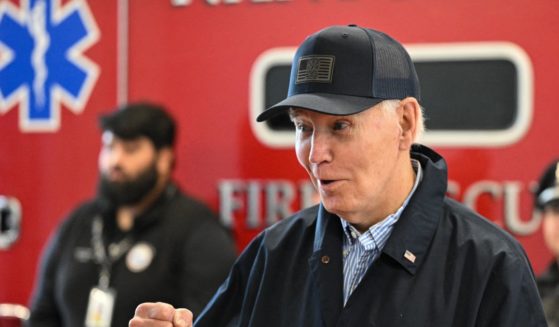This is the face of a man who plans to run the Boston Marathon on Monday
What do you call a guy who gets hit by a truck and breaks his C2 vertebra, also known as a “hangman fracture” because it’s the same bone an executioner’s noose breaks to snap someone’s neck?
If you said “dead,” that’s a very sensible guess and you’d be right the overwhelming majority of the time.
But in this case, the correct answer is “a guy who’s about to run the Boston Marathon after having a metal halo literally anchored to his skull for three months.”
So goes the story from The New York Times of Tim Don, the British endurance athlete who last year set a record in the world-renowned Ironman Triathlon — a 2.4-mile swim, 100-mile bike ride and then a marathon — and who has been competing at an elite level in endurance events since the Sydney Olympics way back in 2000.
Don, 40, wants to run Monday’s Boston Marathon in under 2 hours and 50 minutes — the time it took him to run a marathon after having swam and biked for unholy distances — six months after a training bike ride and nearly his life got cut short by a semi on a lonesome road in Hawaii.
After his injury, doctors installed a metal “halo” held in place with thick titanium pins in order to immobilize Don’s neck to keep him from paralysis or death.
The doctor described the device, saying, “The halo is like a medieval torture device. It’s a miserable experience, but it’s the best option for a complete recovery with no limitations in the long run. You take titanium pins and screw them into your skull, two in front and two in back, and attach them to metal bars, which attach to a bust that you wear for three months and that you can’t take off. It’s pure torture. But it works.”
Making matters worse, the painkillers Don was given were so strong that they made him sick to his stomach.
“Just try throwing up with one of those things screwed into your head,” he said. “I was telling my wife I was going into the garage and getting an Allen wrench to tear it out.”
He had to sleep in that upright position as well; that thick metal ring precluded trying to sleep lying down. Don did not sleep for more than 90 minutes at a time, and blood pooled in his lower extremities, the swelling winning the tug-of-war against the compression socks Don wore to try and prevent it.
But Don’s determination never waned, and in January the halo was finally removed.
https://twitter.com/trithedon/status/948710697961119744
At 40, the window is closing on his athletic career. His livelihood depends on getting out onto those marathon courses and into those triathlons, so he refused to stop working toward that goal of once again competing.
“If I’m going to recover, I’m going to bloody recover,” he said. “I’m going to push the boundaries and come back as soon as I can, as best I can, and try to be even better than before. Why not?”
Well, besides “because you broke your neck, mate,” a perfectly sensible reply under the circumstances.
Don further explained the need to accelerate the comeback, citing his age and saying, “Most things we do regularly in endurance sports — training 25 hours a week, the sessions at altitude, high performance training — in general is not a healthy pursuit. If I was 35, I might say, we can have a dark year. But I’ve only got one or two bites at the cherry.”
So it goes that after six months of grueling physical therapy and treatment, after returning to an elite athletic level, after doing more full-body conditioning work than he’d ever done in his life, Tim Don is about to run the Boston Marathon.
And on that long and hilly road through Boston’s picturesque Metro West suburbs, from Hopkinton to Kenmore Square, Don wants to get there in enough time to catch the end of the Red Sox game that is baseball’s only morning start of the season; the first pitch is at 11 a.m. so that the game can end just as the marathon runners arrive.
As for his career in endurance athletics, Don does have one limit: “That’s to say if I broke my neck another time, I really couldn’t do this again.”
Truth and Accuracy
We are committed to truth and accuracy in all of our journalism. Read our editorial standards.
Advertise with The Western Journal and reach millions of highly engaged readers, while supporting our work. Advertise Today.











